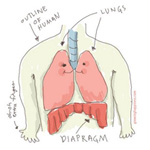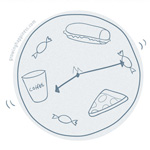Different But Still the Same
I met the other half of my sludge worm fellowship a few days ago. So glad to finally see her again! All the anxiety I had about meeting her quickly melted away as we chatted about the old days and how much (or how little) we’ve changed.

On the surface we looked different – we’re no longer giggly schoolgirls in uniforms, we’ve grown a couple of inches taller and our fashion styles have evolved – but essentially we’re still the same persons. She described our reacquaintance succinctly when she said,
“Everything’s different yet nothing’s changed.” :)
Rekindling Old Flames
A girl friend I’ve been out of touch for nearly 14 years sent me a message out of the blue a few days ago.

We’ve had so many, many good memories together. I shared some of my first crushes with her – Christian Slater, and the boy in who lived at 9th floor in my old apartment. I didn’t know how we drifted apart when we used to be so close in school that we called ourselves “sludge worms”, because of the way we tend cling to each other.
We agreed to meet each other soon and to be honest I’m quite nervous. As Anya commented on my previous post, this feeling is indeed natural. I’m probably afraid that I’d be disappointed with the possibility that the “now” is less sweet than the “then”.
![]()
Recently I started baking again, an activity I used to enjoy tremendously. I had reservations on whether it I’d still be in love with it.
The first batch of cookies I baked was complete failure, something I don’t recall ever happening before, which led me to thinking whether I still had “it”. Disappointed, I decided to continue with the next batch with a different oven setting and sure enough, it did the trick.
It wasn’t me — the new oven just needed some getting used to.
There are a couple more activities I used to enjoy that may need revisiting:
Crochet/Knit
My grandma loved to knit and crochet and I picked the skill from her at a young age (about 8). My interest in it waned when she passed away — I didn’t have access to books on crocheting then and my mother wasn’t into it. Now, there’s a web of online resources on how-to-knit/crochet.
Read Fiction
My reading list is decidedly non-fiction — personal development, psychology, art, science, autobiographies. I love reading and love a good story, I just don’t know why I never thought of picking up a book from the fiction section anymore.
Go to the Theatre
I used to watch, if I could afford it, a stage play every month. I enjoyed watching actors perform in real-time. When I started working in multimedia and video production, my interest shifted to film.
![]()
It’s a little harder to renew a friendship because there are two parties involved but if my recent baking adventure were of any indication, the result could be sweet – though we may need to make some adjustments.
What do you want to do before you die?
I came across this site while surfing today.
It’s interesting to read what people want to do before they die. Most of wishes have to do with self-improvement, having fun, being successful, living a dream, change the world for the better, finding love, starting a family. There are people who want to do everything and there are some who want to do nothing. And quite a number mentiond visiting Tokyo (I understand, I’d love to visit the city again soon!)!
Though I don’t think I want to do nothing, a lot of what I want to achieve (or have done and want to continue doing) is basically same – have fun, making a positive impact on the world, be happy, be at peace, live.
How about you?
Thoughts on Blogging
Comments, Validation and Why We Need the Audience
Stephen wrote a interesting entry on blog validation in the form of comments at his blog One Life. I think most of us share what he is feeling sometimes (or most of the time).
When a blog entry is published, we can safely assume (with the exception of a locked private blog) that the author expects an appreciative audience . And rightly so, for we, as writers, would spend many hours trying to come up with, and edit to near-perfection, a post worthy of publishing to the world.
I used to spend quite a bit of my time wondering why only 1 out of 100 readers would leave me a comment but realised most of the time I myself am not participating in the conversation on other blogs because there’s really nothing new or interesting to add.
Unless a post is particularly provocative, the reaction generally consists of a few variations of agreement or disagreement. It’s like being in a classroom discussion– after the 11th person has voiced his opinion, there’s nothing much left to say that has not already been said.
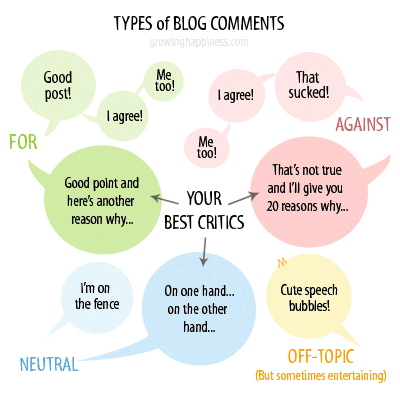
Still, it’s great to have comments! My first blog was running for 7 months before I got my first comment – which is still one of the most exciting days in my early blogging history. :) I also look out for the best critics among my commenters as they are the ones who tell you like it is and probably move in between camps (for/against/neutral) according to what you’re posting.
Here’s something good to know: Problogger has about 50,000 subscribers (according to the displayed Feedburner widget). The actual number of readers may well be more than this but these 50,000 readers are the ones considered “engaged” — readers who care enough about the content of the blog to actually subscribe to the feed. A quick browse through some of the posts shows that less than 1% (or 500) of the readers would actually leave a comment. Steve Pavlina also mentioned in his blog that “well below 1% of visitors ever post a comment“. What are the other 99% doing? Probably just nodding quietly to themselves. How do I know? Because I myself did quite a bit of that nodding thing today. :D
![]()
While some of us see a comment count as the mark of a successful interactive blog, others preach high subscriber count at the true indicator of a blog’s success. Damien on the other hand has gone on to develop his own quantifiable rating system of measuring the success of his Funny Farm – i.e. CAN™.
With a blog that focuses on money-making, success is usually directly proportional to the number of readers the blog has. For other types of blogs, some people have said that the number of readers play a less important role in defining success.
I personally believe that we need an audience no matter what because we want to feel appreciated for our art, in this case, our writing. I don’t want to paint a beautiful picture and keep it locked in a room where nobody will ever see (even if I do not have the intention of selling it). I want it displayed in a gallery for all to appreciate and admire. I call this my “Excellence in Giving to Others”, or *ahem* ego for short. ;)

My ego loves performing in front of huge appreciative audience. She would like to thank you for choosing to read this entry. She is also fond of comments so please leave one (or two)? :D
Road to Success - The Right Attitude and Hunger
Positive thinking plays a big part in determining whether you will be successful and this is how I’d chart their relation:
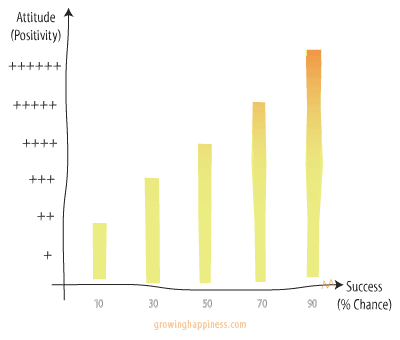
The more positive you are the more likely your are to succeed.
I came across a graph from one of my newspaper clippings collection and promptly pin it up because I like how it outlines another key factor — success is not only determined by the kind of attitude you have but also by how bad you want it (which is to be followed by a plan of action).
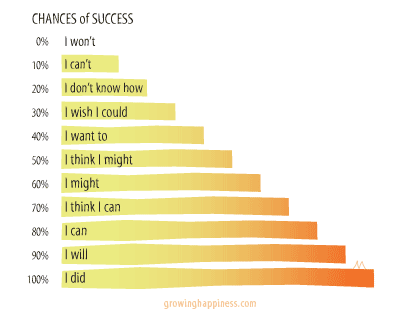
Through purely unscientific inference, I conclude that if we solely depend on positivity, we’ll likely fall into the “I think I might” to “I think I can” spectrum. Therefore, to increase our chances of success, we’ll need to rise to the next level. When you’re at “I can” or “I will”, a natural question that follows will be, “How can I make this work?” and you will be on your way to writing you own blueprint to success.
Of course, there are other factors that would influence your chance of success – connections, luck, fate, cats (having too many cats greatly reduce my chances of a spontaneous getaway — who’s gonna feed all the cats?!) — but as they say, success is 99% perspiration, so get sweating and good luck!
Wisdom Tooth, Warm Coffee and World Domination
Wisdom Tooth
Wisdom teeth are so named because they appear in the late teen years or early twenties, when one becomes an adult, hence wiser. I had my wisdom tooth extracted last week.
My first wisdom tooth surfaced when I was 27. I have a two theories on why it came out so late:
- The lack of calcium in my diet has impeded its growth.
- I wasn’t wise enough in my late teens nor early twenties to rightly acquire Teeth of Wisdom.:p
Does wisdom come with age?
My nephew announced that he wasn’t keen on finding a girlfriend because that would mean he’d have to get a job “to keep her happy”. He doesn’t want to start working now because he needs to play while he’s still young and “that’s why you have these big ambitions for later“. Wise words, from a boy barely 6.
Me? Despite the dentist’s advice, I kept rinsing my mouth regularly the first few hours after extraction, causing the protective blood clot that formed at the former site of my Tooth of Wisdom to be partially unplugged.
Not very wise. :\
![]()
Warm Coffee
I had my first cup of coffee today after days of having only water and yoghurt. I had to drink it lukewarm so as to not aggravate the newly-formed plug in my mouth. Though I had to be content with tepid beverage, the service was sunny.
While waiting for my coffee to cool, I observed the catering staff busying themselves in tasks with clockwork efficiency. Everyone had a part to play. The cheerful old lady has been serving me coffee for the past 5 years. It wouldn’t be wise to assume that she is without lofty ambitions. Probably one of her goals is to provide excellence in customer service.
If that is the case, she has succeeded.
Do all ambitions need to be of grand scale?
![]()
World Domination
I believe there is room in the world for all kinds of ambitions, all types of people. Our world needs all types of people to keep it running smoothly — the ones to do the job and the ones to lead, and the ones who’ll rise above and beyond the rest in terms of influence and reach because they can and because what they do may have the potential to make the world just a little (or a lot) better.
Which type are you? Which would you rather be?
![]()
If you’re interested in being the latter, Chris Guillebeau of the Art of Non-conformity has recently launched A Brief Guide World Domination.

